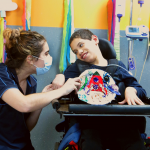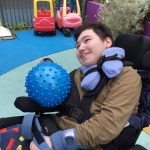How to Support a Family with a Child on the Autism Spectrum
There are more than 200,000 Australians on the autism spectrum. A decent proportion of these individuals are children. Parenting a child on the autism spectrum comes with particular challenges. All families need support to thrive. Community is a key ingredient to healthy family life, no matter the family. This is no different for families who live with ASD. Perhaps, you know a family with a child on the autism spectrum. Maybe they are your neighbours or members of your church. You want to support them. You want to do the right thing. You want to be helpful and loving. But, where do you start? Perhaps you feel overwhelmed or uncertain. Here at Allowah, we work with many families who live with the reality of ASD. Each family is different, but here is some wisdom we’ve collected over the years.
Listen
Every family’s experience of ASD is unique. Children on the autism spectrum present differently and many factors influence this. For some children on the autism spectrum, life looks largely similar to their peers. Others require a far higher degree of support. Don’t assume that you know the situation. Ask questions and listen carefully to the answers. It takes time to understand a family—their needs, desires, rhythms, values and challenges. If you’re stuck for a starting point, try asking:
- When was your child diagnosed with ASD? What has the journey been like since then?
- What are the biggest lessons you’ve learnt as a family through this journey?
- What are the most stressful times of the week for your family?
- How do your other children cope with these challenges?
- What are some of your favourite memories with your family?
We’re not suggesting a Q&A session! As you get to know a family, just take these kind of questions with you into conversation. The answers will begin to paint a picture of this family and their life together. With that knowledge, you are better equipped to provide meaningful support.
Ask for Specifics
Some families will know exactly what they need. If you want to offer support, just ask. From the outside, you can’t necessarily tell what is the most helpful form of support.
Respite
Perhaps the family would love some respite time. This may be something you can help with.
- Could you take care of the kids while the primary carers have a break?
- Could you go round to the family’s house once a week and mind the children while the carers take some time to recharge?
- Could you go with the child’s carers to an appointment or activity, providing an extra pair of hands?
- Could you help pay for a respite holiday or weekend?
Friendship
Every family, no matter their situation, needs to be embedded in community. We all need a listening ear.
- Be ready to listen. Make it clear that you’re ready to pick up the phone.
- Initiate some quality time. Offer the family a chance for some fun!
- Celebrate all the members of the family. Use birthdays and holidays as an excuse to show them love—as individuals and as a family.
- Remember when the family has appointments or tests and ask appropriate follow up questions.
Practical
You may be able to offer valuable practical assistance to a family with a child on the autism spectrum. Remember to ask, ‘what would be helpful?’. Some families might not need any practical assistance, so don’t assume you know what’s best. For a family facing these kind of challenges, stability is important. So, if you commit to offering assistance, be clear about the timeframe and regularity of your commitment. Don’t try and do everything, offer something sustainable.
- Can you clean the house?
- Can you help the other children with their homework, once a week?
- Can you do school pick-up or drop off?
- Can you cook dinner every now and then?
- Can you provide financial assistance for respite or other needs?
Be an Advocate for Inclusion
This final tip is something everyone can implement—whether you know an ASD affected family or not. Personally committing to inclusion is a great way to support those on the autism spectrum. Think about your circles of influence: church, sports clubs, school, work, community groups. How can you ensure that those on the autism spectrum are welcome? This could be as simple as adopting a ‘zero tolerance’ bullying policy or advocating for accessible spaces and activities. We can all be thoughtful. We can all ask questions and listen carefully. We can all use our influence for good.




